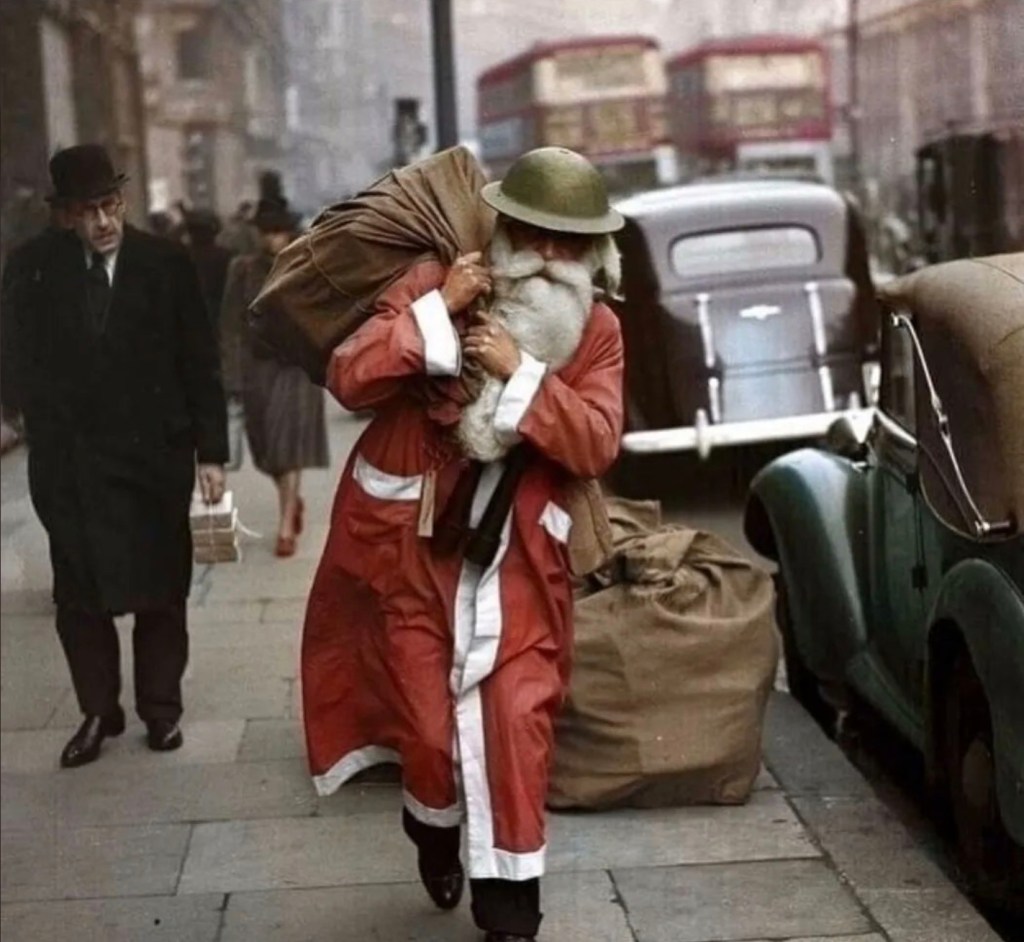Dear Reader,
My latest translation, the French version of Mind Games, available soon 🙂
This week, Magnus Carlsen retained his world chess championship title with a convincing 7.5 – 3.5 victory over Ian Nepomniachtchi, four victories to zero. Carlsen won the sixth game and effectively broke Nepomniachtchi’s spirit because the other three victories were all based on Nepomniachtchi’s errors. Proof yet again that chess is the ultimate mind game.
In the festive issue of Mom’s Favorite Reads…
Holiday traditions and Christmas books.
Plus a seasonal blend of short stories, flash fiction, poetry, photography, travel, articles, activities, puzzles, recipes and so much more!
Father Christmas, delivering his presents in 1940.
My direct ancestor Thomas Stradling Esq was born c1454 in St Donats Castle, Glamorgan, Wales. The son of Henry Stradling and Elizabeth Herbert, Thomas married Janet Mathew c1473 in St Athan, Glamorgan. I was born in St Athan so the village is obviously special to me. Thomas fathered Edward, my direct ancestor, Henry and Jane. He died on 8 September 1480 in Cardiff, Glamorgan having secured the family estates and having served as Lieutenant of Ogmore lordship and castle.
Thomas’ son, Sir Edward Stradling, left a more indelible mark on history. Born c1473 in Merthyr Mawr, Glamorgan, a stone’s throw from my home, Sir Edward married Elizabeth Arundel in St Athan. Politically and financially this was a fine marriage for Edward, although it did end in tragedy when Elizabeth died during childbirth on 20 February 1513 at Merthyr Mawr.
After Elizabeth’s death, Edward remarried. His second wife, and my direct ancestor, was Felice aka Ffelys, daughter of John Llwyd. There is a suggestion that Felice was one of Edward’s mistresses before their marriage. Edward had a number of mistresses. We shall explore that aspect of his life shortly.
When Edward’s father, Thomas, died in 1480 Richard III placed his guardianship with Sir James Tyrrell. This lasted until Richard III’s defeat at the Battle of Bosworth in 1485. Sir James was Elizabeth Arundel’s uncle and he probably arranged Edward and Elizabeth’s marriage.
Medieval marriages were often political affairs with little thought given to romance. The main aims were to produce heirs and build up the family fortune. Therefore, with a lack of romance, mistresses were common. Often, knights and lords found love with these mistresses although given the circumstances the modern phrase “it’s complicated” springs to mind. Wives finding lovers was frowned upon, but human nature found its way and affairs were more common than we might suppose.
Sir Edward and Elizabeth produced six children, four sons and two daughters. With Felice, Edward produced two sons and one daughter, Elizabeth, my direct ancestor. Through various mistresses, Edward produced a further seventeen children, possibly more. At least three of these children were named Elizabeth bringing the total to four daughters named Elizabeth. Maybe Edward named them after his first wife and the repeated use of the name suggests that he held her in genuine affection?
Sir Edward owned vast swathes of land including manors, estates and castles in Glamorgan, Somerset and Dorset. Nevertheless, with over twenty children looking for an inheritance there were problems.
On 17 June 1531, the Countess of Worcester wrote to Thomas Cromwell, the King’s councillor, expressing her concerns about the Stradling claims against her husband. She described Edward Stradling’s sons as, ‘twelve brothers, most of them bastards, and they have no living but by extortion and pillaging of the King’s subjects’.
Furthermore, in 1547 Thomas Fflemyng filed an assault complaint against seven of Edward’s sons and a daughter. Around this time Elizabeth, my direct ancestor, married Sir Edmund Morgan, Baron of Machen and Tredegar, securing her future. However, for many of the Stradling offspring, particularly the bastards, banditry and extortion became a way of life.
After the Battle of the Spurs and the Siege of Tournai in 1513, one hundred men-at-arms, including Edward Stradling, were knighted by Henry VIII in the Norte Dame Cathedral of Tournai on 2 October 1513.
Sir Edward died on 8 May 1535 in St. Donats Castle. He signed his will on 27 April 1535, a clear indication that he was slipping away. He was buried in the chancel of St. Donats Church. However, Edward Stradling MP, the fifth Edward in the family, moved the bones of his grandfather Sir Edward and grandmother Elizabeth to the new Lady Chapel of St Donats.
Edward and Elizabeth might well have married for political reasons, but the family realised, maybe through family folklore and stories, that they should be together in the end.
As ever, thank you for your interest and support.
Hannah xxx
For Authors
#1 for value with 565,000 readers, The Fussy Librarian has helped my books to reach #1 on 32 occasions.
A special offer from my publisher and the Fussy Librarian. https://authors.thefussylibrarian.com/?ref=goylake
Don’t forget to use the code goylake20 to claim your discount 🙂









2 replies on “Dear Reader #131”
Reblogged this on Grant Leishman – Author.
LikeLiked by 1 person
That Christmas edition of Mum’s looks excellent. Need to check that out.
LikeLiked by 1 person